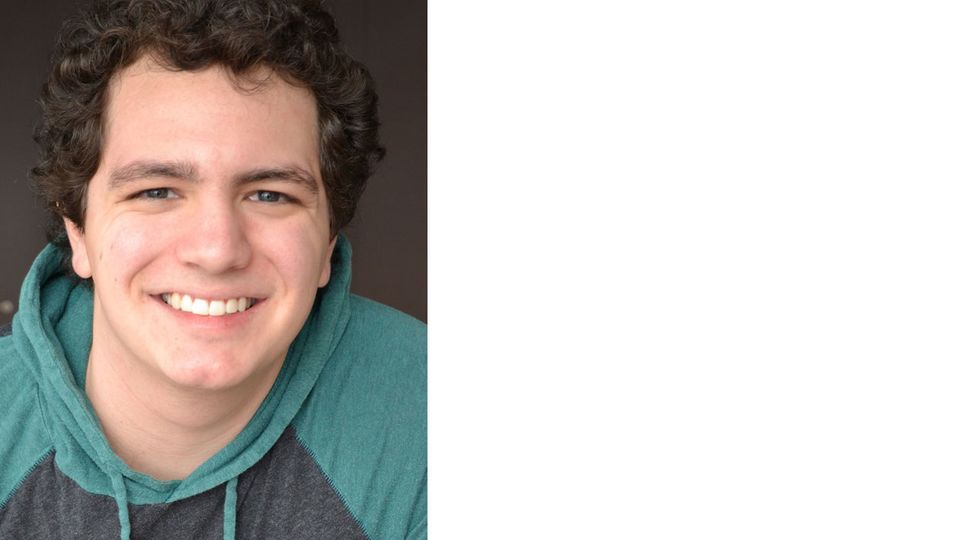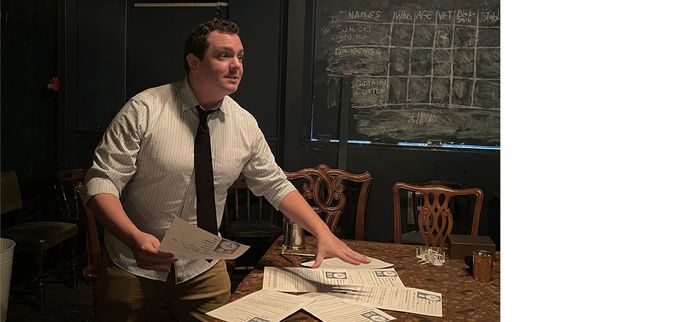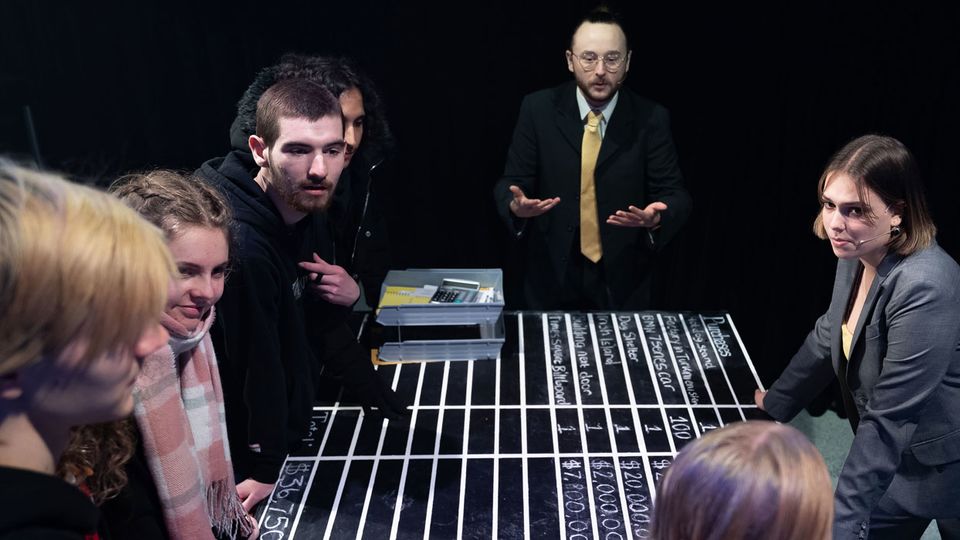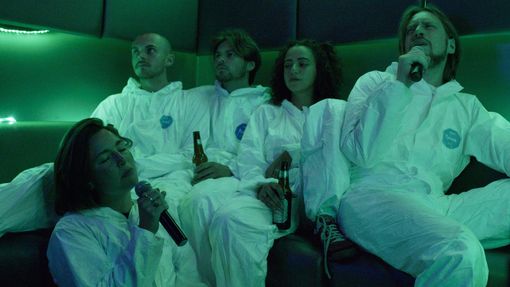
Director, theatre-maker and founder of Ludens Theatre Company, Danny Romeo, reflects on his time studying on Central’s MA/MFA Advanced Theatre Practice course. He shares with us how the course allowed him to pursue his interest in immersive theatre, develop his collaborative skills, and shape his practice.
What made you apply to the Advanced Theatre Practice course?
I was specifically interested in exploring immersive theatre. The immersive industry in the US was pretty small at the time, and I couldn’t find any domestic masters programs which would give me the skill set to create my own immersive productions, or put me in touch with current industry professionals.
I had a few friends who graduated from Central, and they all pointed me in the direction of the MA/MFA Advanced Theatre Practice (ATP) course. After some research I decided that ATP would be the best fit to let me explore my specific area of expertise while also pushing me to expand my boundaries and get out of my comfort zone. The course was flexible enough to allow me to pursue my specific craft, but also rigorous enough to encourage me to explore different avenues and approaches to theatre.
What was your creative background prior to applying?
My undergraduate degree was in musical theatre. I worked as a performer in New York and on national tours for a few years before switching towards a more administrative track. I worked at Sleep No More, an immersive work of theatre created by Punchdrunk, for a few years as well, which was where I fell in love with immersive theatre.
I was interested in becoming an artistic director and founding my own company someday, so I began working in administrative and directing positions. I worked as an audience service manager for several major regional theatres in DC, Baltimore, and Massachusetts, and took on some directing roles in New York and DC. I eventually hit a wall where I was too experienced to direct for free, but not experienced enough to consistently get paid directing jobs, which was when I decided to apply to a postgraduate program.
Can you give us an overview of your time on the course from start to finish, covering the projects and modules you worked on?
In Term 1, I selected the Composition cluster, where we undertook shorter, rapid-fire assignments devising in a variety of styles, usually in small collaborative groups. We also worked with professional practitioners in Practitioner Studies, which were larger workshops for all members on the course. Finally, we took a philosophical and business approach to the current industry in Cultural landscapes, where we explored the ethics of business practices of current companies, prepared mock Arts Council applications, and developed ideas for our own future companies.
In Term 2, we undertook longer-term devising projects in assigned companies. While there were developmental workshops, the primary challenge of this project was to collaborate amongst a group of ambitious, knowledgeable peers and create a piece which best suits everyone in the group. We worked together for the full duration of the term on one full-length original piece, which was then presented to the rest of the course. During this term we also undertook a term-long research project. I chose to collaborate with several members of the creative producing course for this project, which ultimately resulted in some of the most important professional contacts of my early career. The connections I made led to future collaborations on professional productions, my first full-time position with a company, and even international work.
Term 3 was the first term during the pandemic, so my experience was almost exclusively through distance learning. We selected elective classes, and I chose to take Writing for Interactive Media, which fit well with my goals for interactive immersive work. While navigating distance learning for the first time was definitely a challenge, the course was designed to push us to be resilient and find creative solutions, so we had a good foundation to spring forward from. I started learning to use technology I’d never previously considered using, such as filming/editing, game development software, binaural recording, graphic design, and more intensive sound design techniques. Each of these skills have made a massive impact on the kind of work I created later on in my career, and (more importantly) gave me the ability to create and present work in a time when many theatre professionals were at a loss as to how to reach audiences. I also spent this term developing my proposal for my Sustained Independent Project (SIP), which ultimately focused on utilising immersive productions as community-building tools.
Over the summer term, I chose to take part in several MA SIPs, including one digital immersive production and one live gig musical. It felt important for me to continue working through the pandemic, and not fall into a rut. I was excited to collaborate in a more supportive role to execute someone else’s vision, as it gave me a bit more space to learn from my peers’ processes and gather ideas for my own project. Both of the SIPs were performed at Camden People’s Theatre, and were some of the first live performances in London after the lockdown restrictions were eased.
For the duration of my second year of the course, I focused exclusively on my SIP. I chose to undertake an internship with COLAB Theatre productions, where I co-wrote and assistant directed several flagship interactive immersive productions, Crooks 1926 and Flicker. I also helped develop several side projects intended to reach audiences at home, such as a board game and an interactive novel. Finally, I was invited to be lead writer and director on an exclusive, high-profile commissioned production. During this time, I also developed my own interactive immersive production in collaboration with several classmates as well as new colleagues. The final production, titled Sovereign Song, was performed for a month-long run at the COLAB Tavern in Elephant & Castle.

How did the course develop your practice?
ATP strengthened my collaborative skills by leaps and bounds. Most of my previous experience was in clear cut hierarchical situations where there was a clear line of succession that was never meant to be challenged. But working with my classmates, I learned how to productively champion my own ideas while making space for my collaborators as well. The course also pushed me to get out of my own way. With the breadth and speed of the projects and assignments we were given, I learned to trust my creative instincts and stop second guessing my impulses. I learned to throw ideas at the wall, then polish and curate them into a more cohesive product on second and third passes. I’ve also gained a stronger sensitivity for ethics in my creative and business practices, due largely to conversations between my peers during projects. While working in the US, I was taught that theatre is a business, and that profit proves the most effective way of making work. But on this course, I’ve come to learn that profit, while important for sustainability, is only one measure of success, and that a communal experience is significantly more important than making the most money possible. I’ve become a more empathetic creator as a result, and have shifted my practice to focus on community development. However, I think my most important development is my networking skills. I made fantastic friends and artistic partners which have allowed me to thrive after graduation, and I never would have had the opportunity to develop such deep bonds without this course.
How did the visiting lecturers/practitioners and academics help develop you and your practice?
The visiting lecturers provided a diverse array of experience and perspectives. It was great to learn from actively practicing professionals firsthand, and try out their style of devising.
What was the most memorable aspect of the course?
For me, the most memorable part of the course was the SIP. It was a safe space to experiment with my own style in a professional environment. For me, it was a look into how to get the rest of my career rolling, and gave me a major confidence boost moving into my first independent projects after graduation.
What do you think makes a good theatre practice student?
I think the best ATP student is someone who has big ideas, but is excited to explore others’ ideas as well. Someone who is adaptable, self-motivated, and can roll with whatever comes next will do very well on this course. I also think it helps if you come into the course knowing what you want to get out of it, but plenty of my course mates discovered their style during the course as well.

What have you been doing since graduating?
Since graduating, I’ve been working in the immersive industry as a creator, writer, director, performer, designer, and educator. I was an artistic associate with COLAB where I helped create four interactive immersive shows, I originated the role of Cogwright in Phantom Peak and was promoted into an associate directing position. I also performed in Rogue Productions’ The Perfect Crime, and I worked as a composer and sound designer in several immersive productions.
In addition to this, I also founded my own company, Ludens Theatre Company, which is currently developing its third professional production.
I’m most excited about my educational work. I recently developed and taught ICT Brighton’s first ever immersive theatre module for their BA Performance course. The module resulted in over 360 classroom hours, and the development of an original devised interactive immersive production.
What’s next for you?
I plan to continue developing Ludens Theatre Company while also working with other productions, both in the UK and abroad. I’m currently expanding my productions to reach a wider audience, taking inspiration from the larger-scale productions I’ve been a part of. However, I’m also fighting to develop more compassionate, sustainable practices in the industry, particularly where fair pay and credit is concerned. Using my own company as an example, I strive to convince other companies to take care of collaborators and artists as a priority. I also hope to continue my work in higher education, as I feel immersive theatre is an exciting emerging field which could offer immense opportunities for artists just entering the industry. I’m also in discussions with a handful of international companies, and I hope to share work across boarders to encourage further community development both at home and abroad.
Visit Danny Romeo’s website, and follow him on Instagram @dannytromeo, to find out more about him and his work.

